The Constitutive A Priori
The Constitutive A Priori
Developing and Extending an Epistemological Framework
Arthur Sullivan
LEXINGTON BOOKS
Lanham Boulder New York London
Published by Lexington Books
An imprint of The Rowman & Littlefield Publishing Group, Inc.
4501 Forbes Boulevard, Suite 200, Lanham, Maryland 20706
www.rowman.com
Unit A, Whitacre Mews, 26-34 Stannary Street, London SE11 4AB
Copyright 2018 by The Rowman & Littlefield Publishing Group, Inc.
All rights reserved . No part of this book may be reproduced in any form or by any electronic or mechanical means, including information storage and retrieval systems, without written permission from the publisher, except by a reviewer who may quote passages in a review.
British Library Cataloguing in Publication Information Available
Library of Congress Cataloging-in-Publication Data
Names: Sullivan, Arthur, 1970- author.
Title: The constitutive a priori : developing and extending an epistemological framework / Arthur Sullivan.
Description: Lanham : Lexington Books, 2018. | Includes bibliographical references and index.
Identifiers: LCCN 2018006089 (print) | LCCN 2018002345 (ebook) | ISBN 9781498547123 (electronic) | ISBN 9781498547116 (cloth : alk. paper)
Subjects: LCSH: A priori. | Knowledge, Theory of.
Classification: LCC BD181.3 (print) | LCC BD181.3 .S85 2018 (ebook) | DDC 121/.4dc23
 The The paper used in this publication meets the minimum requirements of American National Standard for Information SciencesPermanence of Paper for Printed Library Materials, ANSI/NISO Z39.48-1992.
The The paper used in this publication meets the minimum requirements of American National Standard for Information SciencesPermanence of Paper for Printed Library Materials, ANSI/NISO Z39.48-1992.
Printed in the United States of America
Contents
The question of the a priori is a core issue running throughout the history of philosophy. Variations on this theme include: Is there a non-empirical source of justification? Can an adequate epistemology be developed without appeal to one? What is the precise nature, and status, of non-empirical justification? As the cases of at least Plato, Descartes, Kant, and Frege illustrate, many seminal original philosophical positions have grown out of work on questions surrounding a priori . Further, on some (though by no means all
Recent decades have seen some provocative and potentially epochal work on a priority , which has served to both refine and to complicate maps of the terrain, including: (i) Kripkes (1972) conjectures about contingent a priori and necessary a posteriori statements, and the flood of discussion they sparked; One primary aim of this book is to make some contributions toward a clear-headed evaluation of the upshot of these developments for the issue of a priority .
I will argue that the notion of the constitutive a priori provides the best means, all things considered, of accommodating these recent developments into a coherent, compelling view. The constitutive a priori is a broadly neo-Kantian orientation on the a priori , versions of which were pioneered by
The constitutive a priori is most commonly known as a position within the philosophy of science, the guiding idea being that one of Kants (1781) signature moves provides the means to incorporate unforeseen drastic shocks into existing theory. (The two key catalytic drastic shocks, within the tradition, are non-Euclidean geometry and the theory of relativitycf. Stump (2015) for a thorough account of the development of the constitutive a priori within the philosophy of science.) I aim to show that the notion of the constitutive a priori provides not merely a satisfactory epistemological framework, but, further, a compelling way to accommodate and integrate some of the most significant lessons learned in twentieth-century philosophy. The distinctive original contribution of this present work lies in the case it builds for taking this constitutive a priori orientation as a good means of integrating and consolidating certain epochal insights of Wittgenstein, Carnap, Quine, Kripke, and Kaplan.
Down a confluent avenue, Soames (2003: Vol. I, xi) asserts that one of the most significant achievements of twentieth-century philosophy is precisely the success achieved in understanding, and separating from one another, the fundamental notions of logical consequence, logical truth, necessary truth, and a priori truth. One of the strands within this general trend which I will develop in this book, and which plays a role in defining its structure, is a judicious distinction between the a priori and two closely related notionsthat is, the metaphysical notion of necessity and the semantic notion of analyticity. Developing and defending a suitably refined notion of a priority depends on a clear-headed and refined view of the relations between properly epistemological considerations and distinct questions and issues in bordering parts of semantics and metaphysics.
[]
Here is the plan. Part I gives a working, reasonably comprehensive introduction to the terrain. The question of a priority is developed from a conceptual point of view (in 1.1) and from a historical point of view (in 1.2). The rest of chapter 1 and all of chapter 2 are dedicated to fostering technical precision when it comes to certain distinctions and refinements, pertaining to concepts, thought, and language.
Part II then consists of separate analyses of the substance of the metaphysical concept of necessity, the semantic concept of analyticity, and the epistemic concept of a priority , and considers arguments for and against the intelligibility and worth of each concept.
Part III is an exploration of what I take to be the two main recent shocks to the a priori that is, the challenge of revisability (associated with Quine, circa 1950) and the externalist challenge (associated with Kripke, circa 1970). Here the original philosophical contributions of this present research begin to really develop, in the course of working through these epochal challenges. It is here that the contours, and the benefits, of a constitutive a priori view get drawn out in an innovative way.
Finally, the aim of Part IV is to map out a constitutive a priori view. I address the precise entailment relations between the concepts of necessity, analyticity, and a priority . I also consider general questions about the relations between the three subfields of philosophical inquiry in which they belong, as well as some of the perennial philosophical questions of which these three concepts are core ingredients.
[]
A final note about the structure of the book: Parts I and II might appear to be mere stage-setting before getting into the heart of the matter; if so, why are they so long? Why does the stage-setting take up more space than the featured play? My answer as to why so much careful attention is paid to conceptual clarity and fine distinctions may well be typical of philosophy generallyor, at least, of the kind of philosophy which takes twentieth-century philosophy of language to have constituted an important step in the maturation of this ancient discipline. These preliminaries are essential to defining concepts and propositions which are sufficiently precise as to promise worthwhile engagement. In particular, it will take a lot of careful digging to defend a priority (and some of its fellows, such as analyticity) from some of the considerable mass of problems and objections which have been raised against it.
By the end of Parts I and II, I will have accrued a precise toolkit, an apparatus of instruments, which will then be available for further jobs. In this way the explanation for the excessive length of Parts I and II also and thereby accounts for the relative brevity of Parts III and IV; those latter tasks can only be dealt with after the painstaking work done in Parts I and II. The glamorous work of developing the original philosophical contributions of this present research can only happen once the relatively dry and dusty conceptual housecleaning is properly executed.

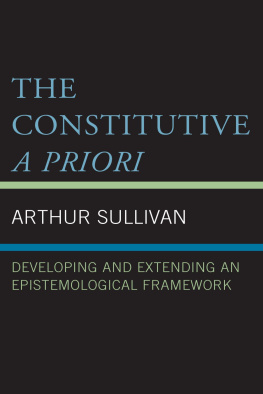



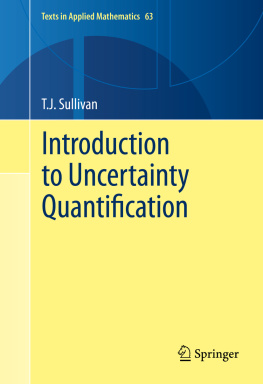

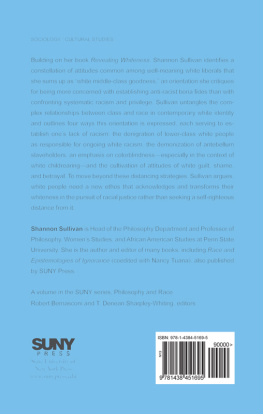
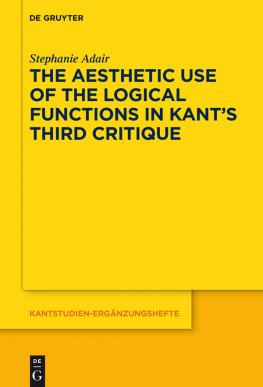

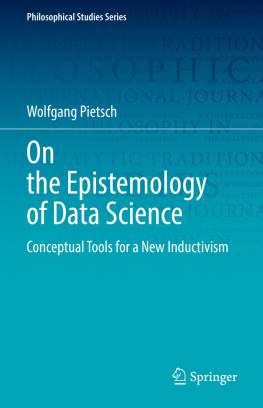
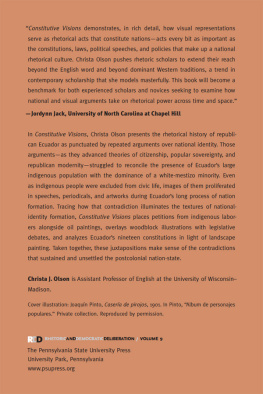
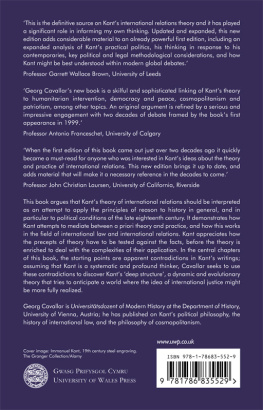
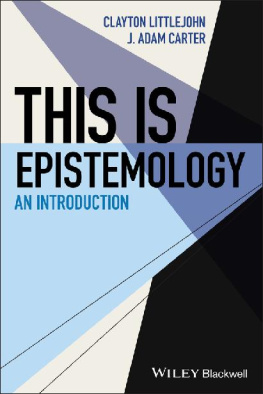

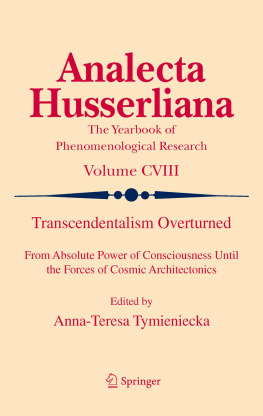




 The The paper used in this publication meets the minimum requirements of American National Standard for Information SciencesPermanence of Paper for Printed Library Materials, ANSI/NISO Z39.48-1992.
The The paper used in this publication meets the minimum requirements of American National Standard for Information SciencesPermanence of Paper for Printed Library Materials, ANSI/NISO Z39.48-1992.